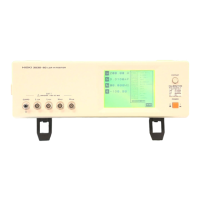174
_____________________________________________________________________________________________
7.5 Test Accuracy
______________________________________________________________________________________________
Zmin = 1.0144 kΩ × (1 - 0.08/100) 1.0136kΩ
Zmax = 1.0144 kΩ × (1 + 0.08/100) 1.0152kΩ
θmin = 78.69 - 0.05 = 78.64° (θ: |θ| absolute value)
θmax = 78.69 + 0.05 = 78.74°
Csmin = 1/(Zmax x ω x sinθmax) 159.85 nF ........ -0.09%
Csmax = 1/(Zmin x ω x sinθmin) 160.15 nF ....... +0.09%
ω =2x π x f
f: frequency [Hz]
Test speed FAST NORMAL SLOW SLOW2
C 5 2 1.5 1
Cable length 0m 1m
D 1
(100 kHz max) 1.5 + 0.015 f [kHz]
(100.1 kHz min) 1.5 + 0.3 f [MHz]
f: measurement fre
uenc
Temperature Operating temperature = T
E 0.1 basic accuracy |T-23|
From the basic accuracy, find ranges that each of Z and θ can take.
From the ranges of Z and θ, determine ranges of Cs can take.
Hence the accuracy of Cs is 0.009
2. Test speed coefficient (C)
3. Test cable length coefficient (D)
(When using a 1.5C-V coaxial cable)
4. Temperature coefficient (E)
Note The above mesurment specification was determined using a 1.5C-
2V coaxial cable with an established cable length for the unit.
Using a cable other than a 1.5C-2V, or a cable that not an
established length for the unit in question increases the chance of
measurement inaccuracy. A large capacitance between the H
terminal and grounding capacitance (GND) or the L terminal and
GND may result in mesurement inaccuracy. Please set the GND to
10pF or less.

